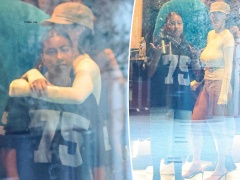
Dolly Parton has always been true to herself — even if it got her into some trouble.
In an interview with the Guardian published Monday, the “Jolene” songstress revealed that she based her iconic, over-the-top appearance off the “town tramp,” a local woman who wore high heels and tight skirts.
“She was flamboyant. She had bright red lipstick, long red fingernails,” Parton told the outlet.
“She had high-heeled shoes, little floating plastic goldfish in the heels of them, short skirts, low-cut tops, and I just thought she was beautiful.
“When people would say, ‘She ain’t nothing but trash,’ I would always say, ‘Well, that’s what I’m gonna be when I grow up.”

But it turns out that her preacher grandfather was one of those people. In fact, Parton said her grandpa used to physically punish her for the way she dressed — but she didn’t care.
“I was willing to pay for it,” she said. “I’m very sensitive, I didn’t like being disciplined – it hurt my feelings so bad to be scolded or whipped or whatever. But sometimes there’s just that part of you that’s willing, if you want something bad enough, to go for it.”
While some of her family looked at the “town tramp” as “trash,” Parton thought that woman represented something else: an escape from the norm.

The singer’s mother — and just about every other women in her Tennessee town — spent most of their lives making a home and baring children, which Parton “did not want for [herself].”
“My mom and my aunts – I grew up with women knowing how to be good mothers, but that was just not what I felt God had in mind for me,” she said. “Because somebody’s got to entertain those people, to write songs about them.”
She continued, “I can write a song as if I had a house full of kids, I can write a song as if I’ve got a cheating husband, even though I never did. But I know what it’s like; I’ve seen it, been around it. There’s no thing in this world that’s foreign to me, that I don’t get or understand.”

So as Parton’s career got bigger, so did her hair and the number of rhinestones on her dresses.
Although she stands behind her fashion choices — and the reason she started dressing like that in the first place — the Grammy winner, 77, admits that it has sometimes worked against her.
According to Parton, record executives used to beg her to change her look and thought the whole thing was just a big joke.

“I’ve always been true to myself,” the “I Will Always Love You” singer said.
“My look came from a very serious place. That’s how I thought I looked best,” she continued. “Sometimes that’s worked for me, sometimes it can work against you. It took me probably years longer to be taken serious, but I wasn’t willing to change it, and I figured if I had the talent, it’d show up sooner or later.”
Parton’s new book, “Behind the Seams: My Life in Rhinestones,” which documents her life and career in clothes and costume, is available on Oct. 17.






